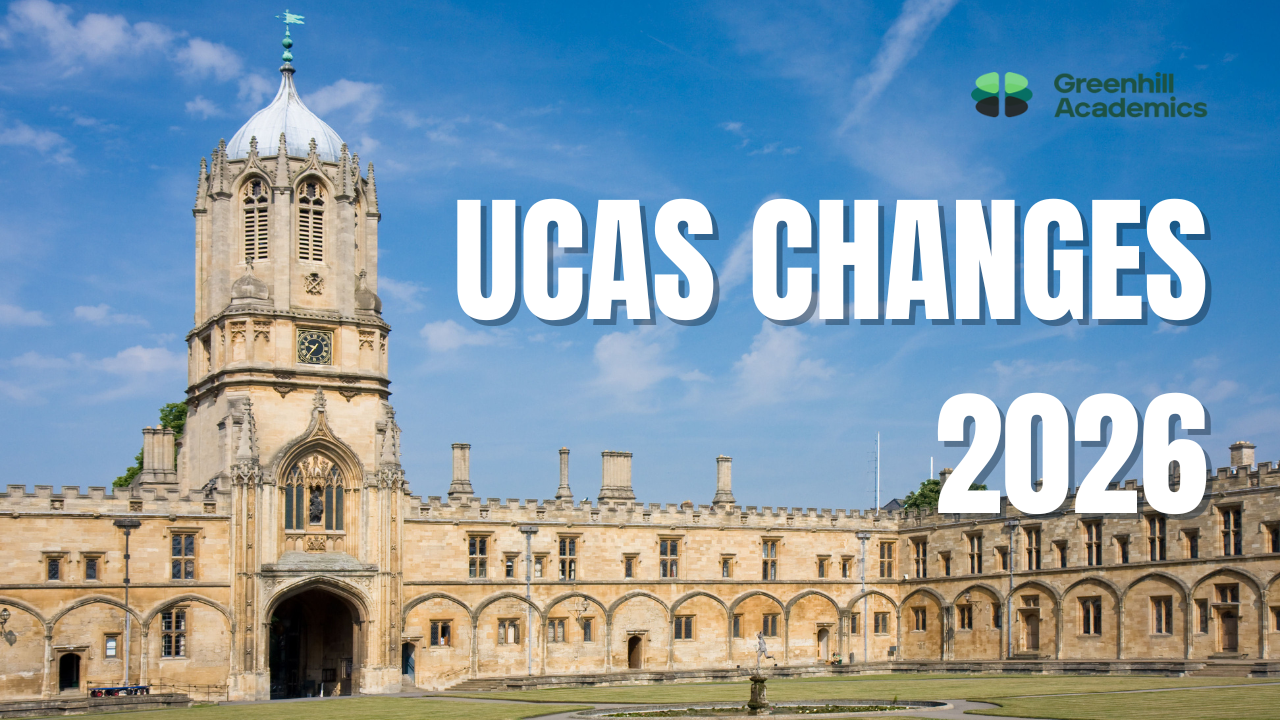🚨 Major UCAS Announcement – July 2024
Personal statements for 2026 entry will replace the traditional essay format with THREE SPECIFIC QUESTIONS
📱 The Questions Everyone’s Asking:
- Has anyone heard about these UCAS changes for 2026?
- Are we preparing our kids for the wrong thing?
- Should we be changing our A-Level strategy?
- Will this make universities more or less competitive?
Parents who’ve been planning their child’s university path suddenly feel like the goalposts have moved. Here’s what’s actually happening: these changes aren’t something to fear – they’re a chance for families who understand them early to get ahead.
What Exactly Is Changing for 2026 Applications?
Starting September 2025, students applying for 2026 university entry will face a completely new personal statement format. Instead of writing one 4,000-character essay, they’ll answer three specific questions.
UCAS designed this change to make the process “easier and more structured” and to help students avoid the daunting blank page. The three questions provide scaffolding to ensure students include exactly what universities want to see.
Focus areas: Your motivations and inspirations, knowledge of the subject area through super-curricular activities, and how the course fits your future plans or career goals.
Focus areas: How your formal education relates to your chosen course, relevant transferable skills you’ve developed, and educational achievements beyond grades (competitions, leadership roles, etc.).
Focus areas: Work experience and volunteering, personal life experiences or responsibilities, hobbies and extracurricular activities, and achievements outside formal education.
Students still have 4,000 characters total, with a minimum of 350 characters per question. They can distribute the remaining characters however works best for their story.
Are We Helping Our Child Prepare for the Wrong Thing?
This worry makes complete sense. You’ve been encouraging your child to read widely, develop deep subject knowledge, and build interesting personal stories. Now you’re wondering if all that work is suddenly useless.
Actually, it’s the opposite. Everything you’ve been doing to help your child develop real academic interests matters more than ever. The new format doesn’t change what universities want – it just gives clearer structure for showing it.
Your child still needs authentic passion for their subject, solid academic preparation, and worthwhile experiences outside the classroom. The three questions just provide a better framework for presenting these qualities.
Families who grasp this early can start building more targeted experiences that directly answer each question, putting their children ahead of those who don’t adapt.
Will This Make Applications More or Less Competitive?
Many families fear the structured format will make it harder for their child to stand out, especially if they’ve been building unique personal statement stories.
This change is designed to level the playing field, particularly for students who don’t have access to professional writing support. But this creates an interesting situation for well-prepared families.
While the format is more structured, what universities want to see remains exactly the same. They still want passion, academic preparation, and relevant experiences. Families who help their children develop these authentically will still have real advantages.
The key difference is that exceptional applications now need to excel within a more standardised framework. This actually rewards substance over style – which benefits students with real interests and experiences over those relying purely on clever writing.
For competitive courses at top universities, the bar stays just as high. The three questions simply provide clearer guidance on how to meet that bar.
How Do We Turn This Into Our Advantage?
Smart families are already adapting their university preparation to work with the new format. Here’s how you can build targeted preparation for each question:
Question 1: Building Real Academic Passion
Help your child identify what actually motivates them. Has a particular book, expert, or moment sparked their interest? Encourage super-curricular activities – research beyond the classroom that shows curiosity about their chosen field.
The most compelling responses come from students who can explain specific aspects of their subject that fascinate them and connect their course choice to clear future plans, whether career-focused or broader life goals.
Question 2: Academic Achievement That Matters
Look beyond grades to educational accomplishments that actually mean something. Could your child compete in subject competitions, take on leadership roles, or pursue additional qualifications outside school? Universities want to see how formal education has developed transferable skills that matter.
Help your child reflect on how their studies connect to university-level work. Which subjects are developing critical thinking, research abilities, or analytical skills that will transfer to their chosen course?
Question 3: Experiences That Actually Prepare Them
This is where well-prepared families can gain the biggest advantage. Help your child seek worthwhile experiences – work placements, volunteering opportunities, or personal responsibilities that develop qualities relevant to their intended course.
The key is reflection. Any experience included should demonstrate skills, knowledge, or personal qualities that universities value. Even personal challenges or family responsibilities can be powerful if they’ve developed resilience, empathy, or maturity.
What Universities Actually Want to See
Understanding what admissions tutors look for can help transform your approach to the new format. Helen Bousfield-Myatt, HE Admissions Team Leader at Hartpury University and College, explains: “When we consider an application we want to understand why someone has applied for the course, what interests them about it, and what inspires them to pursue education and a career in this area. An applicant is more than a set of qualifications; of equal importance is what they do outside of their studies. We use the personal statement to understand this.”
This shows that the core requirements haven’t changed with the new format. Universities still want to see real passion, relevant preparation, and evidence of potential. The three questions just provide clearer structure for showing these qualities.
What About Oxbridge and Competitive Courses?
The most selective universities will still expect exceptional applications, regardless of format changes. But the structured questions actually provide clearer guidance on what they’re looking for.
For Oxbridge applications, the academic focus remains paramount. The three questions help students allocate their content more effectively – Question 1 for demonstrating deep subject knowledge and intellectual curiosity, Question 2 for showcasing academic achievement beyond grades, and Question 3 for relevant experiences.
Competitive courses in subjects like Medicine, Law, and Engineering will continue to place heavy emphasis on relevant work experience and demonstrated commitment. Question 3 provides a dedicated space to showcase these experiences, while Question 1 allows students to demonstrate real understanding of what their chosen career involves.
Should We Change Our A-Level Strategy?
The core principles of A-Level selection remain unchanged. Your child should choose subjects they’re genuinely interested in and that meet university entry requirements for their intended courses.
However, the new format does emphasise the importance of being able to articulate how your studies prepare you for university-level work. This means encouraging your child to engage deeply with their A-Level subjects rather than just achieving high grades.
Help them understand how their subjects develop critical thinking, research skills, and academic rigour that will transfer to university study. This understanding will be crucial for answering Question 2 effectively.
What Really Makes Applications Successful
Successful university applicants share common qualities that matter regardless of format changes. Research from admissions offices consistently shows these characteristics distinguish the strongest candidates.
Real Subject Engagement: Students who show authentic intellectual curiosity through independent reading, research, and exploration consistently impress admissions tutors. This depth of engagement matters more than perfect application technique.
Relevant Experience: The most compelling applications showcase experiences that directly relate to the intended course of study. Students who can explain how their activities prepared them for university-level work stand out regardless of application format.
Early Preparation: Families who understand changing requirements early gain real advantages. Students with time to build relevant experiences and develop authentic interests consistently outperform those who rely on last-minute application tactics.
The pattern is clear: students who focus on building real academic interests and relevant experiences adapt successfully to any application format, while those who rely purely on application technique struggle with changes.
How Our University Admissions Consultants Navigate UCAS Reforms
Major application reforms require expert guidance to transform potential disruption into real advantage. Our admissions consultants specialise in helping families adapt their university preparation to changing requirements.
Ryan holds a high 2:1 degree in History and Modern Languages from Jesus College, Oxford, where he achieved First Class marks in both his bridge essay and extended thesis. He understands how universities evaluate applications and helps families build compelling stories within any format requirements.

Francesca studied English at Christ Church, Oxford, graduating with a 2:1 and earning a scholarship for academic excellence. She has extensive experience helping students craft personal statements and understands how to adapt application approaches to new requirements while maintaining authenticity.

Both consultants emphasise that successful university preparation involves developing real academic interests and building relevant experiences, regardless of application format. They help families create plans that position students for success under the new UCAS system.
Your 2026 Application Action Plan
Start Building Question-Specific Experience Now – Help your child identify gaps in their preparation for each of the three questions. Which areas need strengthening before they apply?
Document Academic Development – Encourage your child to keep a record of how their studies are developing university-relevant skills. This preparation will be crucial for Question 2.
Seek Smart Experiences – Look for opportunities that directly relate to your child’s intended course. Quality and relevance matter more than impressive-sounding activities.
Build Subject Knowledge Gradually – Help your child develop real knowledge beyond A-Level requirements. This foundation will make Question 1 compelling and authentic.
Connect Academic and Personal Learning – Encourage your child to reflect on how their formal education and personal experiences work together to prepare them for university study.
The 2026 UCAS changes aren’t something to fear – they’re a chance for well-prepared families to get ahead through early understanding and targeted preparation.
Experience the Greenhill Academics Difference
Our university admissions consultants don’t just help with applications – they help families develop plans that position students for success regardless of changing requirements. We understand both traditional and reformed application systems and know how to help your child build the strongest possible foundation.
We specialise in transforming uncertainty about admissions changes into real advantage. Our consultants help families adapt their preparation approach to maximise their child’s chances under the new UCAS system.
Turn UCAS Changes Into Your Family’s Advantage
Connect with our admissions experts who understand exactly how to help your child succeed under the new 2026 application system.
2026 UCAS Changes FAQs
No. The new format only applies to students starting university in 2026, which means applications submitted from September 2025 onwards. 2025 entry applications still use the current personal statement format.
Universities helped design the new format to make applications clearer and fairer. They’re supportive of the changes and will evaluate all 2026 applications using the same three-question structure.
No. The core requirements for university courses remain the same. Choose A-Levels based on your child’s interests and university entry requirements, not application format changes.
The entry standards for competitive courses remain unchanged. The new format provides clearer guidance on how to present your application effectively, which can actually help well-prepared students.
Focus on building genuine academic interests, relevant experiences, and the ability to articulate how your child’s preparation connects to their university goals. The substance matters more than the format.
The new format is actually more flexible for students with evolving interests. The three questions allow them to explain their current passion and how their journey led them there.
While not essential, expert guidance can help families adapt their preparation strategy to maximise competitive advantage under the new system. Book a free consultation to discuss your family’s specific situation.
Currently, only the personal statement format is changing for 2026 entry. Other parts of the application process remain the same, though UCAS continues to evaluate potential improvements.
